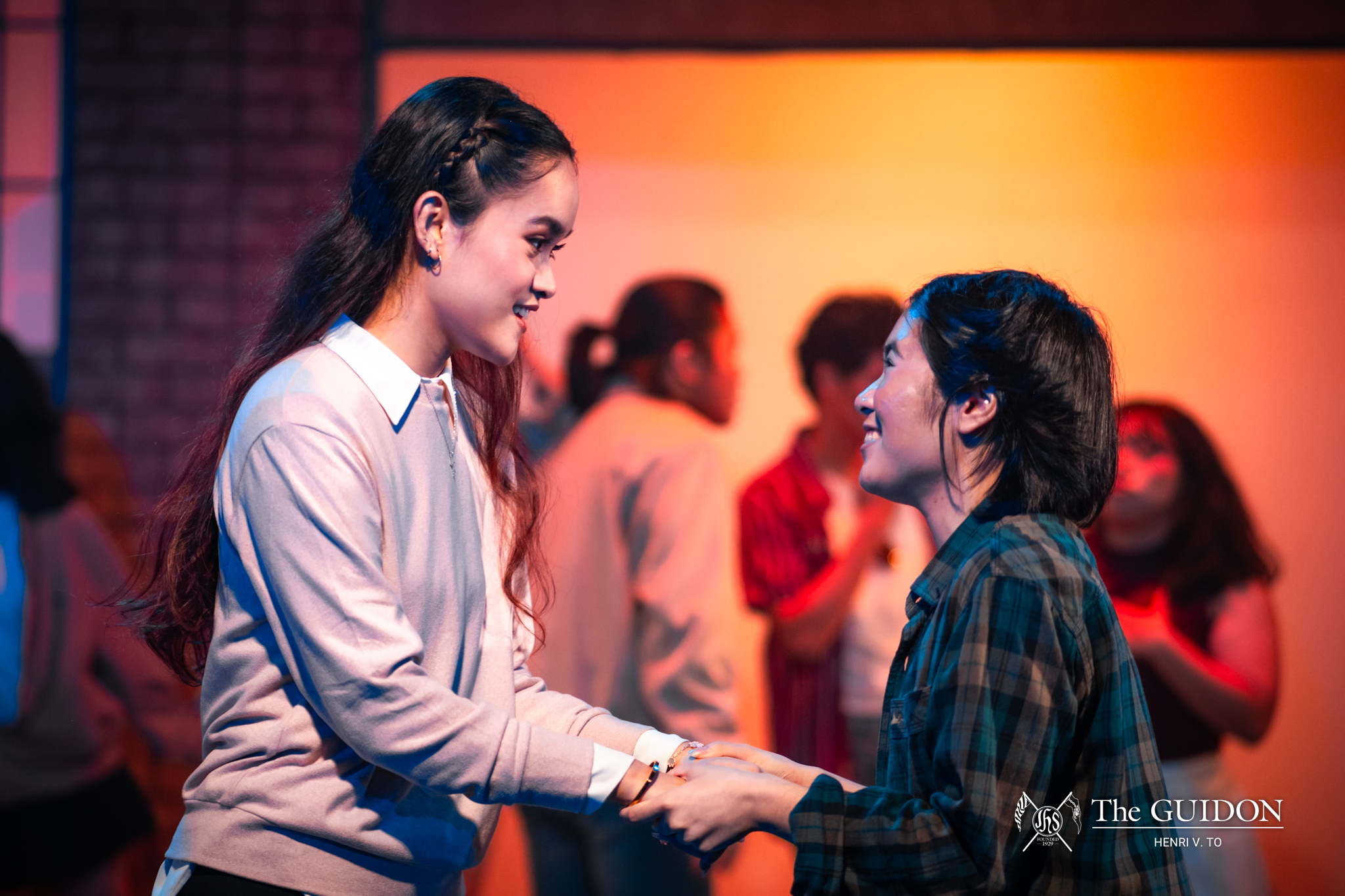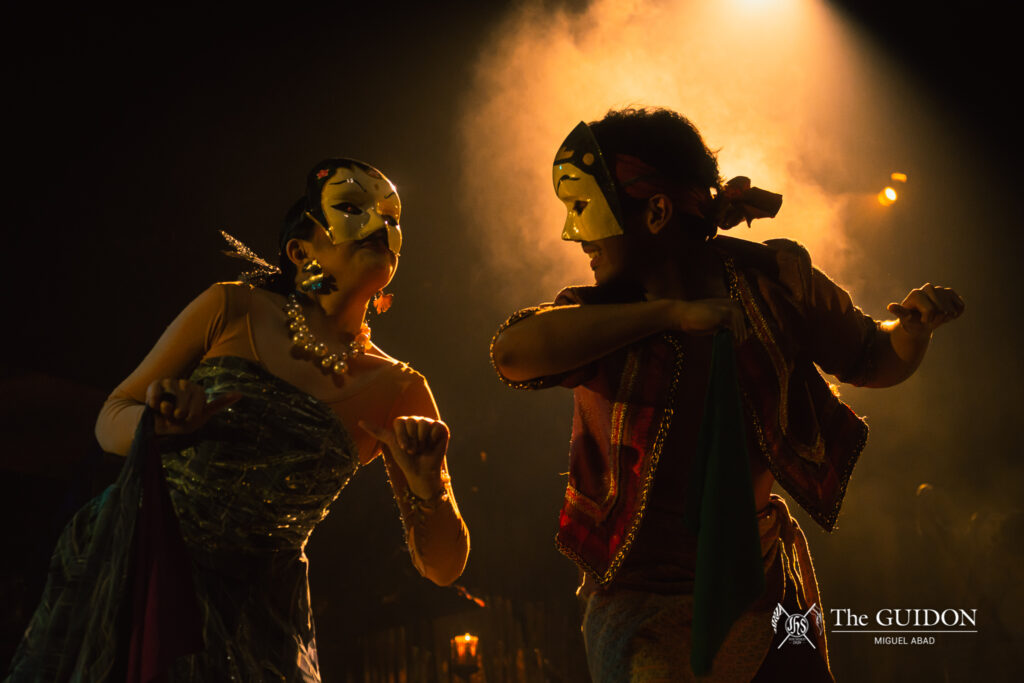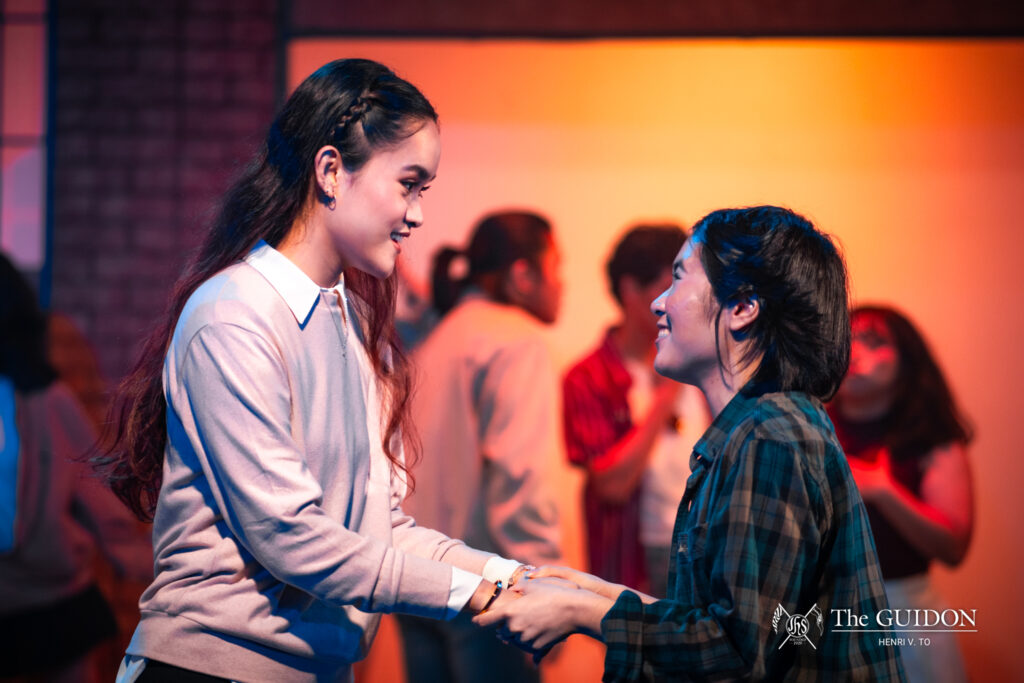“WE’RE GONNA help that little lesbian, whether she likes it or not!” declares a freshly-cancelled Broadway star, setting the stage for a theatrical journey of love, hope, and queer acceptance.
Adapted from the 2018 Broadway musical by Matthew Sklar, Chad Beguelin, and Bob Martin, the PROM debuts in Southeast Asia under Abi Sulit’s direction as Ateneo Blue Repertory’s 33rd Season Newbies Production. The musical comedy brandishes comical wit and heartfelt performances in an ode to the LGBTQIA+ community.
A campy comedy with an unruly heart
The PROM follows four Broadway actors trying to salvage their declining careers with a publicity stunt poorly disguised as celebrity activism. Carlos Siongco’s immersive set and Jethro Nibaten’s purple-pink lighting open the musical with Broadway stars Deedee Allen (Khassie Cañada) and Barry Glickman (Andre Blas), who are basking in the seemingly successful opening of their newest musical Eleanor. Their celebrations are cut short, however, when the New York Times criticizes the leads’ egomania, shutting their showdown on the first night.
Freshly unemployed, Deedee and Barry travel with ‘in-between gigs’ Juilliard graduate Trent Oliver (Marco Castaneda), sidelined chorus girl Angie Dickinson (Sabel Lamadrid), and their publicist Sheldon Saperstein (Polo Mendiola) to the conservative town of Edgewater, Indiana. Their mission: prove the ‘narcissist allegations’ wrong by saving high school student Emma Nolan’s (Andie Lopez) prom from the homophobic Parent-Teacher Association (PTA). Led by Mrs. Greene (Ana Rocio Tabayoyong), the PTA bars Emma from attending prom with her lesbian date—who happens to be Alyssa Greene (Celine Andrea Tam), Edgewater’s golden girl and Mrs. Greene’s closeted daughter.
The first act “Changing Lives” is fairly satisfactory, if a little self-contained as far as show openers go. Considered with the rest of the PROM’s repertoire, it emerges as forgettable, immediately overshadowed by the next two numbers. First, its campy reprisal better lands the musical’s tongue-in-cheek humor, flaunting a more self-assured personality than its predecessor. Then, “Just Breathe,” a compelling solo by Lopez, brings the audience’s hearts to Emma’s small town.
The PROM, beloved for its self-aware cheekiness and meta-musical humor, is made even funnier with blueREP’s production-wide, soul-deep commitment to the bit. This is most apparent in “The Acceptance Song,” a satirization of performative allyship that is topped by one audio-visual gag after another, from Atienza’s deliberately corny choreography to Siongco’s obnoxiously pro-gay props. Arguably the PROM’s most underrated number in theater canon, “The Acceptance Song” becomes one of blueREP’s most memorable performances with comedic spunk that colors the rest of the musical.
The PROM isn’t just for jokes, though—before you know it, your tears of laughter might just turn into genuine tears from a stricken nerve. Amid its zazzy wit is a tender message: “I am who I am, and I think that’s worth fighting for.” This conviction in the queer community’s right to embrace their true selves is palpable in “Unruly Heart.” As an ensemble piece where Atienza’s choreography is simple, Nibaten’s lights are stark, and Siongco’s set consists of one bed and wall, it is the musical’s strongest number because of the hope and love resonating from its core.
This coexistence of humor and poignancy champions queer love with audacious flair. In the spirit of its advocacy, the PROM is neither a political statement nor a moral sermon: it is an over-the-top love story, and I wouldn’t have it any other way.
Now, about the newbies…
BlueREP’s 33rd Season Newbie Production wouldn’t have such an emotional impact without its outstanding characterization. Soloists especially delivered rousing performances under Maia Dapul’s musical direction and Andy Reysio-Cruz’s sound design.
Khassie Cañada had big shoes to fill as the glamorous, egotistic, two-time Tony Award winner Deedee Allen. In Deedee’s high heels, she absolutely struts as she performs “It’s Not About Me” and “The Lady’s Improving,” boasting strong vocals and even stronger charisma.
Andre Blas and Sabel Lamadrid also charm as Broadway divas Barry and Angie respectively, showcasing their dancing chops through Atienza’s flirty, jazz-inspired choreographies in “Barry Goes To Prom” and “Zazz.” Marco Castaneda deftly twists Trent’s characterization to slapstick-level hilarity, as his impeccable comedic timing and delivery propel him to be a crowd-favorite with “The Acceptance Song” and “Love Thy Neighbor.”
Bolstered by voguish styling and entertaining chemistry, this quartet is difficult to dislike even as out-of-touch narcissists, making their eventual character development all the more gratifying.
The portrayal of the Indiana small-towners, though not as flamboyant as their Broadway-based counterparts, is just as compelling. RJ Paderayon delivers one of the musical’s most pristine vocal performances with “We Look To You.” Meanwhile, Ana Rocio Tabayayong gives depth to Mrs. Greene’s shrill helicopter-mother persona by embodying her imperfect yet profound love for her daughter, Alyssa. Performed by Celine Andrea Tam, Alyssa Greene’s eponymous solo is subtly heartbreaking.
Most convincing is Andie Lopez’s heart-on-flannel-sleeve portrayal of Emma, which grounds the entire production in reality. The role seems crafted for Lopez, whose sweet soprano, unassuming earnestness, and staunch optimism imbue Emma with an instinctive likability.
As individuals, Lopez and Tam are stars in the making, but their joint portrayal of Emma and Alyssa’s relationship lacks the thrumming heart underlying the rest of the play. Their duet “Dance With You,” while delivered with beautiful vocals, is far more convincing when Lopez or Tam is facing the audience than when they are facing each other.
Fortunately, both appear more natural with the rest of the cast. Lopez’s interactions with Blas manage to convince the audience that a small-town high schooler could become best friends with middle-aged Broadway stars in a few days. Meanwhile, despite only having a few moments onstage, Tam and Tabayayong capture the nuances of a mother-daughter relationship that hit home with queer youth around the world.
But the duo that rocks the dance floor? Paderayon and Cañada. Their portrayal of the budding romance between Principal Hawkins and Deedee is akin to watching a fireworks display.
Alongside the soloists, the rest of the cast and ensemble wholeheartedly embody their roles, whether as comic relief or emotional catalysts. Though some ensemble dance breaks slightly underwhelm, the performers themselves shine with a joy that remains infectious nonetheless.
‘Show the world it can be done’
“Build a prom for everyone,” Emma rallies as the musical draws to a fairytale ending. Homophobic townsfolk transform into allies, celebrity narcissists learn to be selfless, and the girl finally gets the girl. This cookie-cutter conclusion is entirely intentional and narratively gratifying, no matter how unrealistic. After all, the PROM is a story of hope.
Hope is needed most while standing between the gap of what should be and what is. In the Philippines, a predominantly Catholic nation that shares many of Edgewater’s conservative ideals, the Sexual Orientation and Gender Identity Expression (SOGIE) Equality Bill remains pending in the Philippine Congress after more than twenty years. Many queer youths today resonate all too well with the stories of Emma and Alyssa, searching for hope as they struggle for their right to love—their right to live.
Backed by a cast and crew that hold its message close to their hearts, blueREP’s the PROM portrays humanity’s capacity for change and reminds the queer community that their queerness is worth fighting for. The musical is ultimately a comfort that one day, the world will open its arms for you, no matter who you love—but ‘til that day comes, you’ll always have space to dance at the PROM.






